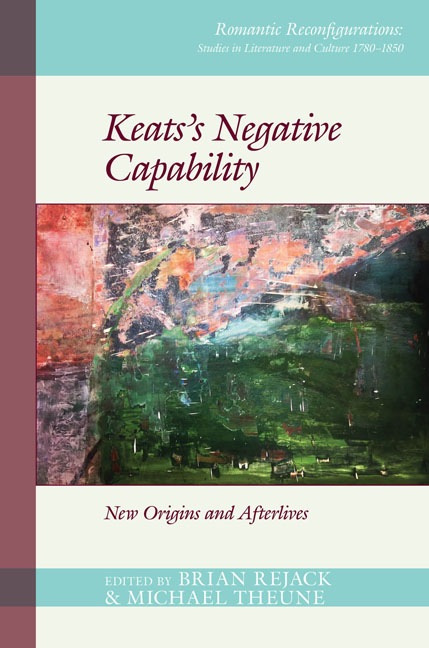Book contents
- Frontmatter
- Contents
- List of Figures
- Acknowledgments
- List of Abbreviations
- List of Contributors
- Preface
- Introduction: Disquisitions: Reading Negative Capability, 1817–2017
- Part I ‘swelling into reality’: New Contexts for Negative Capability
- Part II ‘examplified throughout’: Forms of Negatively Capable Reading
- Part III ‘pursued through Volumes’, Volume I: Negative Capability in Twentieth- and Twenty-First-Century American Poetry
- Part IV ‘pursued through Volumes’, Volume II: Adaptations, Appropriations, Mutations
- Afterword: Reading Keats's Negative Capability
- Bibliography
- Index
5 - Negatively Capable Reading
- Frontmatter
- Contents
- List of Figures
- Acknowledgments
- List of Abbreviations
- List of Contributors
- Preface
- Introduction: Disquisitions: Reading Negative Capability, 1817–2017
- Part I ‘swelling into reality’: New Contexts for Negative Capability
- Part II ‘examplified throughout’: Forms of Negatively Capable Reading
- Part III ‘pursued through Volumes’, Volume I: Negative Capability in Twentieth- and Twenty-First-Century American Poetry
- Part IV ‘pursued through Volumes’, Volume II: Adaptations, Appropriations, Mutations
- Afterword: Reading Keats's Negative Capability
- Bibliography
- Index
Summary
It is difficult to define the kind of knowledge one gains from literature. A reader may encounter new concepts that facilitate the organization of future knowledge or new facts that affect the perception of history, but these forms of learning do not seem to capture what is most meaningful about a reading experience. Through the reading of science or history or philosophy we acquire forms of knowledge that are certain, explicable, and sharable, but what we learn from literature calls for another way of speaking. The knowledge literature gives is ineffable, experienced as an event. Bounded by the stability of the text and the contingency of a reader's circumstances, an act of reading nevertheless opens an infinity within these limits, like the infinity between zero and one.
In order to enable a way of talking about this ineffable, experiential knowledge, this essay juxtaposes the writings of contemporary phenomenologist Jean-Luc Marion and romantic period poet John Keats. As unlikely as this pairing may seem, both Keats and Marion offer concepts that clarify the means through which reading grants knowledge that exceeds certainty. As Marion says, some ‘kinds of knowledge’ could be
described as noncertain, but should not be considered as uncertain, because the indetermination here plays the role of a positive qualification of that which is to be known. … In a word, certitude sometimes constitutes an obstacle to the true knowledge of certain phenomena.
Literature's knowledge is noncertain. A predeterminative expectation that a work could grant its readers only factual or conceptual knowledge would be the sort of obstacle that Marion describes. And yet scholars and readers still lack a vocabulary for discussing the noncertain knowledge that literary readers receive. Keats recognized this when he proposed the term ‘negative capability’ to describe the capacity poets have to let themselves be overwhelmed by the otherness of the work they are creating. Shakespeare, he says, exemplifies this capacity because he is a man who ‘is capable of being in uncertainties, Mysteries, doubts, without any irritable reaching after fact & reason’ (LJK, I: p. 193). Such a capacity allows a certain recognition that some insight has been achieved without needing to define that insight in a determinative way. Christina Gschwandtner points out that Descartes's concept of intuitus provides an important precedent for Marion's noncertain knowledge.
- Type
- Chapter
- Information
- Keats's Negative CapabilityNew Origins and Afterlives, pp. 79 - 92Publisher: Liverpool University PressPrint publication year: 2019

